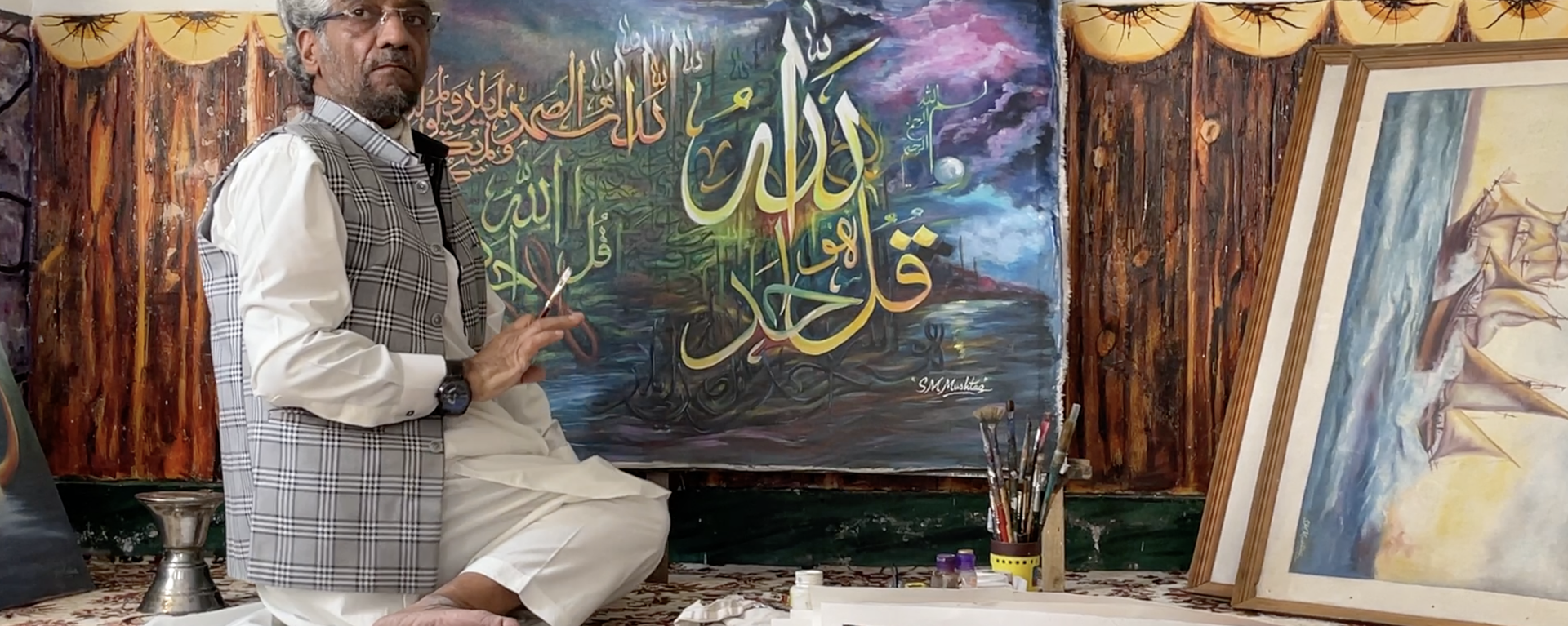https://sputniknews.in/20231007/kashmiri-youth-empowering-local-businesses-4635611.html
Kashmiri Youth Empowering Local Businesses
Kashmiri Youth Empowering Local Businesses
Sputnik India
Mir Shariq, a resident of Jammu and Kashmir's summer capital Srinagar founded a startup named BizLaw in 2018. Shariq, after studying the inability of local Kashmiri businesses to create a brand name despite possessing top quality products, helps local businesses to obtain trademarks.
2023-10-07T20:37+0530
2023-10-07T20:37+0530
2023-10-07T20:37+0530
jammu and kashmir (j&k)
kashmir valley
europe
russia
india
business
startups
economics
sputnik exclusives
https://cdn1.img.sputniknews.in/img/07e7/0a/07/4663760_2:0:761:427_1920x0_80_0_0_1684f2f5f7849dcdb54e8a9610174bf0.jpg
Conversations with Kashmiri traders usually follow a pattern. They talk about their dwindling businesses and then reminisce about the 'good old days'. Most of the traders talk about how Kashmir's famous pashmina shawls, silk carpets, walnuts and apricots found their way to global markets because of their quality and authenticity, despite the lack of communication technology.Almost all of them have anecdotes of customers from across the world - Europe, the United Kingdom, the Gulf, and Russia. While some people possess photographs of themselves with foreigners, others showcase their customers posing alongside their exquisite shawls, carpets, and furniture made of the finest walnut wood.Most conversations end on a sour note, and one concern that comes up persistently during conversations with Kashmiri traders, especially those dealing in handicrafts, saffron, dry fruits, or spices, is of "fake products."The problem, however, is not limited to "fakes" alone, as discovered by Mir Shariq, a 30-year-old Kashmiri youth and the owner of a Kashmiri start-up that helps businesses operate.Shariq founded BizLaw in 2018 after identifying the need to address the inability of local Kashmiri businesses to create brands or brand names despite possessing top-quality products.According to Shariq, Kashmir has not been able to produce a single global brand for any of its top products. Not only have Kashmiri businesses lagged in capitalizing on their brands in the past, but a more serious issue also threatens their future, as Shariq found out during his research.The reason behind this is non-local businesses allegedly using the brand name of Kashmir to sell products that may not necessarily be from the region.To address this, the administration in the Kashmir region is assigning geographical indication (GI) tags to various products manufactured or produced in the area. A GI tag is assigned to products that have a specific geographical origin, thereby helping customers identify authentic products. This process helps distinguish Kashmiri products by highlighting their unique qualities.However, Shariq believes that a more fundamental mechanism that could have significantly assisted Kashmiri businesses and their products is registering and trademarking their businesses.His organization specializes in helping businesses register their trademarks with the Federal government of India, and so far, he has assisted nearly 300 businesses in the region.But his efforts to raise awareness about trademarks in Kashmir are far from achieving what the 30-year-old plans.Research conducted by Shariq and his team shows that out of more than 800 businesses that have "Kashmir" in their names (as a suffix or prefix), over 90% are non-Kashmir based establishments.As a result, small and medium-sized businesses in the handicraft, agriculture, and horticulture sectors have almost zero presence globally, while large businesses in India and abroad that resell goods from the region have become the face of famous Kashmiri products."There is, of course, nothing illegal about it, but the issue is that local businesses who have not created their brands are suffering in the modern digital era. A simple Google search for the best Kashmir saffron produces results of places that are not from Kashmir. Of course, they might be selling genuine saffron from Kashmir, but one fact that is undeniable is that no Kashmir company is in the top searches," Shariq told Sputnik at his Srinagar office.For instance, companies based in south and northeast India in the business of incense and flowers have "Kashmir" in their names, but their products have nothing to do with the region. "Ideally, a brand name like Kashmiri flowers should be registered by a Kashmir-based business, but it isn't," Shariq added.The lack of awareness about trademarking is staggering. One of Shariq's clients is someone who had managed to create a name for his saffron. The name of his shop became popular, and in no time, 16 other individuals from Kashmir used the same name. It was only after Shariq's efforts that the client will likely earn the trademark.Shariq identified the need to establish a one-stop shop for advertising, marketing, and registering businesses and founded a company almost a decade ago called Media Mail.While the younger generation understands the need for media marketing, branding, and advertising, the older business class remains both unaware and ill-equipped to deal with the modern market changes.As Shabir Ahmed, a Pashmina seller based in Srinagar, mentioned, "Our word meant something. Our work spoke for itself. We are just trying to survive now. The distributors, fashion designers, and outside businesses are the real winners."These are words that Shariq cannot reconcile with. For Shariq, his start-up is not only providing services to open businesses, but it is also about the survival of identity.
https://sputniknews.in/20230928/cancer-survivors-passion-for-painting-brings-catharsis-in-kashmir-4475025.html
jammu and kashmir (j&k)
kashmir valley
europe
russia
india
Sputnik India
feedback.hindi@sputniknews.com
+74956456601
MIA „Rossiya Segodnya“
2023
Azaan Javaid
https://cdn1.img.sputniknews.in/img/07e6/0c/08/19280_0:0:1080:1080_100x100_80_0_0_d0f3f10ac6f30fb5b9e5e21a5e2536ea.jpg
Azaan Javaid
https://cdn1.img.sputniknews.in/img/07e6/0c/08/19280_0:0:1080:1080_100x100_80_0_0_d0f3f10ac6f30fb5b9e5e21a5e2536ea.jpg
News
en_IN
Sputnik India
feedback.hindi@sputniknews.com
+74956456601
MIA „Rossiya Segodnya“
Kashmiri Youth Empowering Local Businesses
Sputnik India
Kashmiri Youth Empowering Local Businesses
2023-10-07T20:37+0530
true
PT1M55S
Sputnik India
feedback.hindi@sputniknews.com
+74956456601
MIA „Rossiya Segodnya“
Azaan Javaid
https://cdn1.img.sputniknews.in/img/07e6/0c/08/19280_0:0:1080:1080_100x100_80_0_0_d0f3f10ac6f30fb5b9e5e21a5e2536ea.jpg
kashmiri business, kashmiri economy, arts, handicraft of kashmir, kashmiri dry fruits, kashmiri carpets, pashmina shawls, india, kashmir
kashmiri business, kashmiri economy, arts, handicraft of kashmir, kashmiri dry fruits, kashmiri carpets, pashmina shawls, india, kashmir
Kashmiri Youth Empowering Local Businesses
Moved by the challenges faced by local businesses in Kashmir to establish their reputation for providing exceptional products, Mir Shariq sprang into action and established BizLaw. Shariq provides invaluable assistance to local businesses in acquiring trademarks.
Conversations with Kashmiri traders usually follow a pattern. They talk about their dwindling businesses and then reminisce about the 'good old days'.
Most of the traders talk about how Kashmir's famous pashmina shawls, silk carpets, walnuts and apricots found their way to global markets because of their quality and authenticity, despite the lack of communication technology.
Almost all of them have anecdotes of customers from across the world - Europe, the United Kingdom, the Gulf, and Russia. While some people possess photographs of themselves with foreigners, others showcase their customers posing alongside their exquisite shawls, carpets, and furniture made of the finest walnut wood.
Most conversations end on a sour note, and one concern that comes up persistently during conversations with Kashmiri traders, especially those
dealing in handicrafts, saffron, dry fruits, or spices, is of "fake products."
The problem, however, is not limited to "fakes" alone, as discovered by Mir Shariq, a 30-year-old Kashmiri youth and the owner of a Kashmiri start-up that helps businesses operate.
Shariq founded BizLaw in 2018 after identifying the need to address the inability of local Kashmiri businesses to create brands or brand names despite possessing top-quality products.
According to Shariq, Kashmir has not been able to produce a single global brand for any of its top products. Not only have Kashmiri businesses lagged in capitalizing on their brands in the past, but a more serious issue also threatens their future, as Shariq found out during his research.
The reason behind this is non-local businesses allegedly using the brand name of Kashmir to sell products that may not necessarily be from the region.
To address this, the administration in the Kashmir region is assigning geographical indication (GI) tags to various products manufactured or produced in the area. A GI tag is assigned to products that have a specific geographical origin, thereby helping customers identify authentic products. This process helps distinguish Kashmiri products by highlighting their unique qualities.
However, Shariq believes that a more fundamental mechanism that could have significantly assisted Kashmiri businesses and their products is registering and trademarking their businesses.
His organization specializes in helping businesses register their trademarks with the Federal government of India, and so far, he has assisted nearly 300 businesses in the region.
But his efforts to raise awareness about trademarks in Kashmir are far from achieving what the 30-year-old plans.
Research conducted by Shariq and his team shows that out of more than 800 businesses that have "Kashmir" in their names (as a suffix or prefix), over 90% are non-Kashmir based establishments.
As a result, small and medium-sized businesses in the handicraft, agriculture, and horticulture sectors have almost zero presence globally, while large businesses in India and abroad that resell goods from the region have become the face of famous
Kashmiri products."There is, of course, nothing illegal about it, but the issue is that local businesses who have not created their brands are suffering in the modern digital era. A simple Google search for the best Kashmir saffron produces results of places that are not from Kashmir. Of course, they might be selling genuine saffron from Kashmir, but one fact that is undeniable is that no Kashmir company is in the top searches," Shariq told Sputnik at his Srinagar office.
For instance, companies based in south and northeast India in the business of incense and flowers have "Kashmir" in their names, but their products have nothing to do with the region. "Ideally, a brand name like Kashmiri flowers should be registered by a Kashmir-based business, but it isn't," Shariq added.
The lack of awareness about trademarking is staggering. One of Shariq's clients is someone who had managed to create a name for his saffron. The name of his shop became popular, and in no time, 16 other individuals from Kashmir used the same name. It was only after Shariq's efforts that the client will likely earn the trademark.
Shariq identified the need to establish a one-stop shop for advertising, marketing, and registering businesses and founded a company almost a decade ago called Media Mail.
While the younger generation understands the need for media marketing, branding, and advertising, the older business class remains both unaware and ill-equipped to deal with the modern market changes.
As Shabir Ahmed, a Pashmina seller based in Srinagar, mentioned, "Our word meant something. Our work spoke for itself. We are just trying to survive now. The distributors, fashion designers, and outside businesses are the real winners."
These are words that Shariq cannot reconcile with. For Shariq, his start-up is not only providing services to open businesses, but it is also about the survival of identity.


